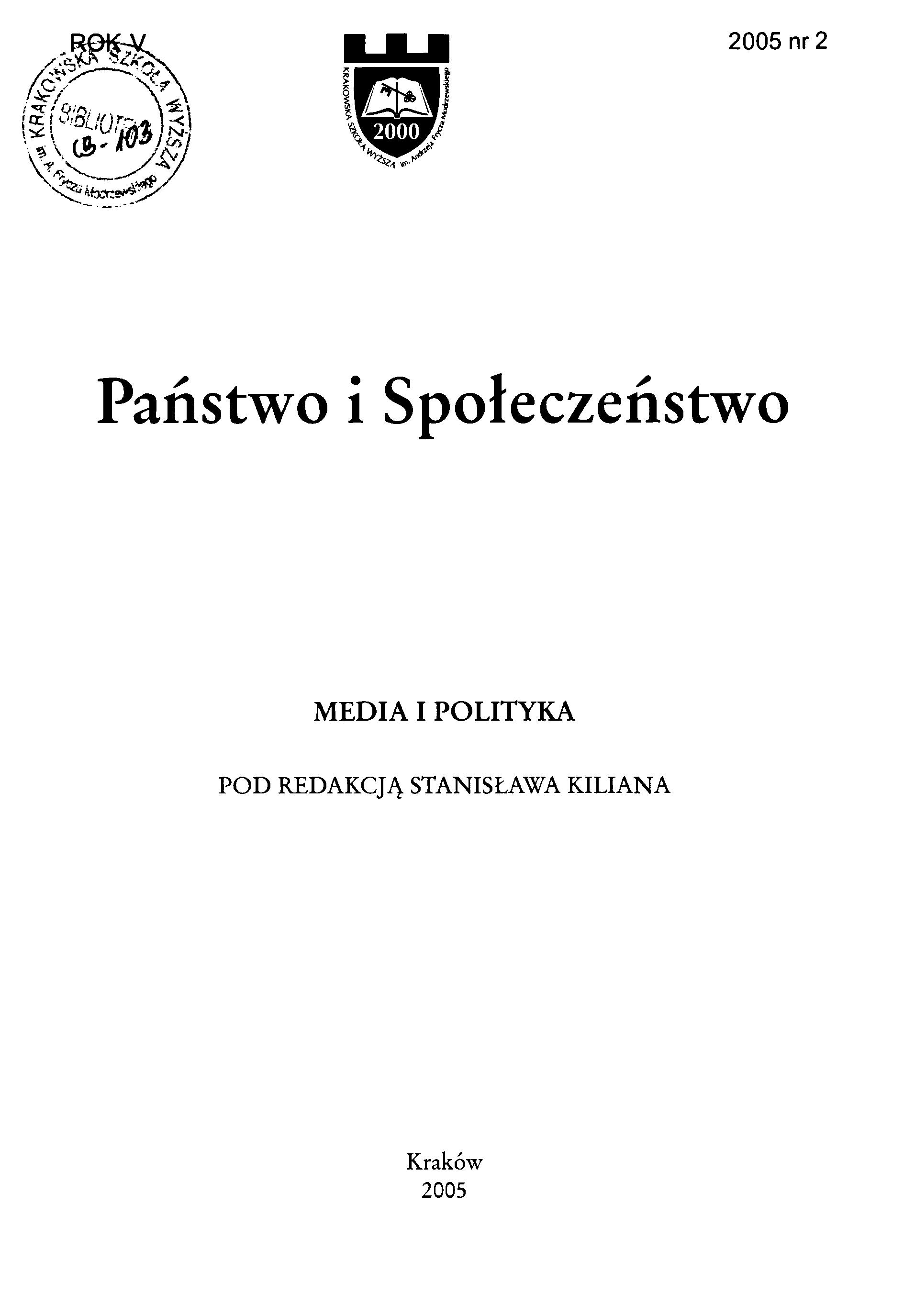
We kindly inform you that, as long as the subject affiliation of our 300.000+ articles is in progress, you might get unsufficient or no results on your third level or second level search. In this case, please broaden your search criteria.

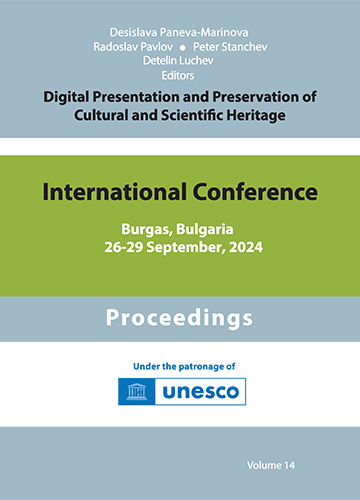
The Cyrillo-Methodian heritage is a common phenomenon of European value, promoting religious tolerance, cultural equality, and understanding of European cultural history and identity. The virtual cluster KYRILLOMETHODIKON developed at the Cyrillo-Methodian Research Centre (CMRC) at BAS is part of the Centre of Excellence "Heritage BG" (BG05M2OP001-1.001-0001 Project), aiming to provide structured knowledge on this phenomenon and its manifestations. The digital repository offers resources for research on the first stage of Slavic Christian culture with an accent on its Old Bulgarian part, reflecting the multidisciplinary research paradigm of the Centre: studies in medieval literature, linguistics, history, theology, art history, and anthropology. To ensure the educational socialisation of the research in these disciplines, a Scientific and Educational Interdisciplinary Centre for Cyrillo-Methodian studies was created within the framework of KYRILLOMETHODIKON, sharing educational tools for a wide range of audiences, including children, school students, undergraduates, and doctoral candidates.
More...
Water Management Digital Knowledge Repository presented in this article is unique in the sense that it helps to preserve the heritage of water profession and facilitates access to the latest information for a wider public. This is particularly important in a country where water-related disasters have not only threatened the people in the past but unfortunately, they need to be prepared for such events in the future, too. Therefore, the digital knowledge repository, based on six pillars (eLearning, Photos, Videos, Journals, Textbooks, Glossary), plays a valuable and important role in Hungary.
More...
This paper presents a new research approach for technological solutions in the ProNature project to create an innovative software platform for serious educational games with creative visualization to build competence on natural ecosystems, responsible management of natural resources and environmental protection. With the built software platform and based on created educational game scenarios, demonstration serious educational games with creative visualization will be developed in a selected eco-context.
More...
The main results of the work of the team of the Institute of Mathematics and Informatics at the Bulgarian Academy of Sciences on the research projects CLaDA-BG – the Bulgarian National Interdisciplinary Research e-Infrastructure for Resources and Technologies in Favor of the Bulgarian Language and Cultural Heritage, Part of the EU Infrastructures CLARIN and DARIAH and No KP-06-N50/4 30.11.2020 “Fourteenth Century South Slavonic Scribes and Scriptoria (Palaeographical Attribution and Online Repertorium)”, will be presented during the Information Day within the DiPP2024 conference. The main emphasis will be placed on developments and implementations of CultIS – a web-based software platform for intelligent digital management and presentation of large data sets and knowledge from the fields of culture, humanities, and social sciences.
More...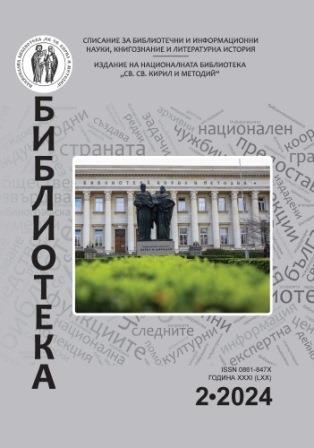
This announcement presents the results of the increase in documents in the library collection received under the Act on the compulsory deposit of printed and other works for the publication of distributors and media service providers, through purchase, donation and book exchange in the period 2018-2022, presented as statistical information in tables and diagrams extracted from the National Register of Books Published in Bulgaria, from the public reports of the St.St.. Cyril and Methodius National Library, the annual reports of the Collection of library documents department and the library-bibliographic system COBISS.bg. The data from the requested and received library documents by types in the collection of the SS. Cyril and Methodius National Library and their distribution in deposit libraries in the country.
More...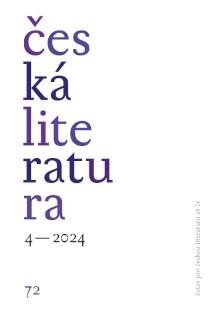
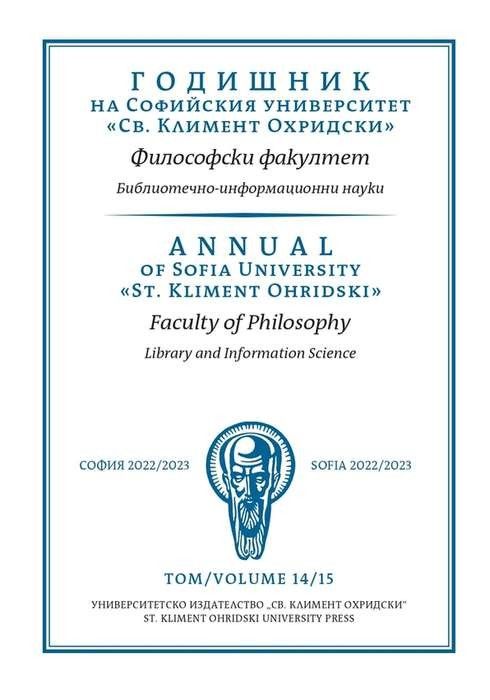
Anniversary Scientific Session on the 70th anniversary of the Department of „Library Science, Scientific Information and Cultural Policy“
More...
Research Projects on "Accessibility of Information E-Services of Regional Libraries" (2022), "The Links between the Development of the Internet and the Monetization of Digital Data" (2022), "The Unchanging Imperative for Change: 70 years of the Department of Library Science, Scientific Information and Cultural Policy$ (2023).
More...
Defended dissertation on the topic "The National Historical Narrative of the Bulgarian Revival: Presentations at the National Museum of History$ (2022)
More...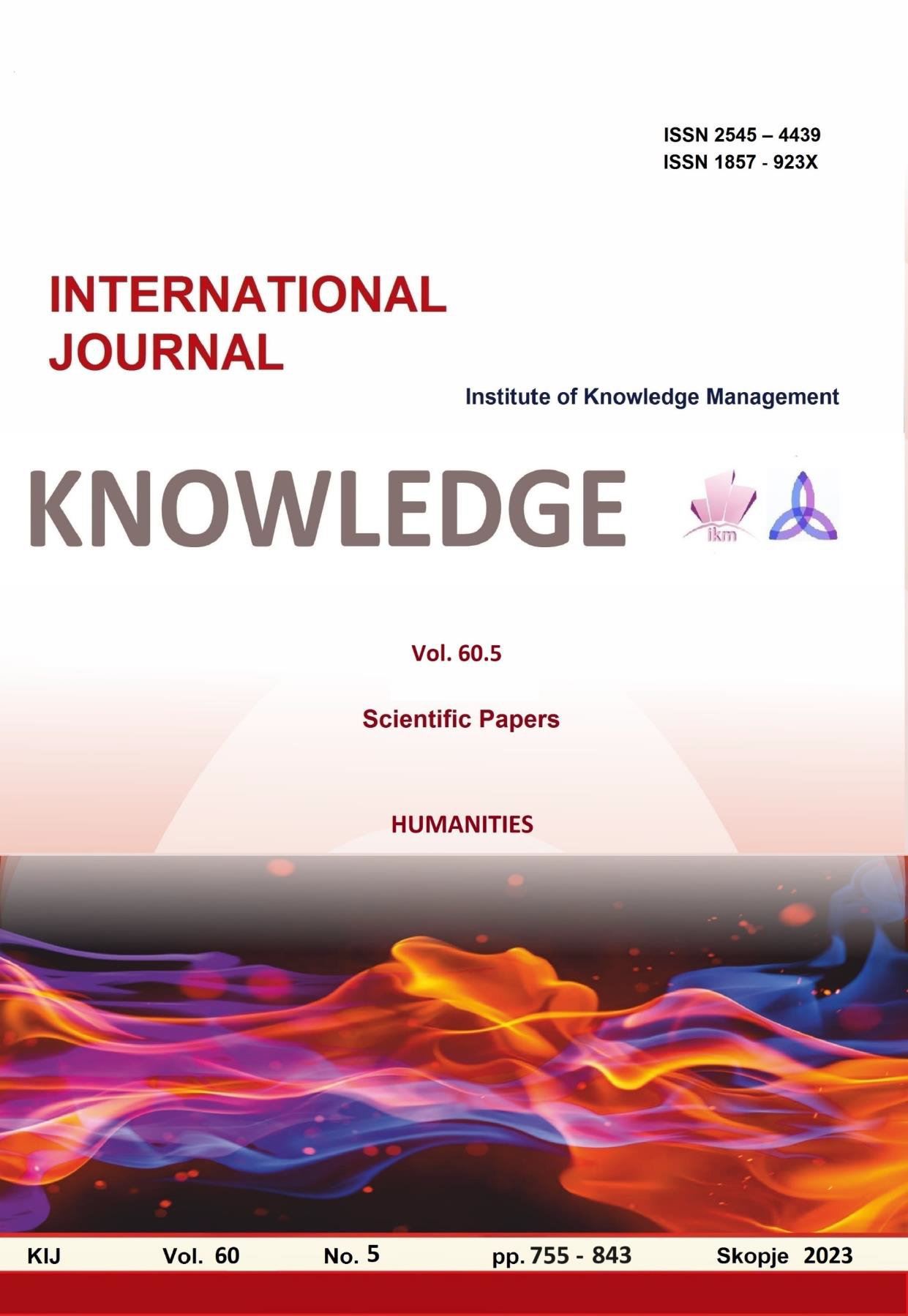
Vodnjan is a city on the Istrian peninsula. According to the 2021 census, it has 5,838 inhabitants, of which 59.7% are Croats, 15% Italians, 5.5% Bosniaks, and Albanians, Montenegrins, Roma, Serbs and other of the twenty two recognized national minorities in Croatia. The community of Italians in the town of Vodnjan (Comunità degli Italiani di Dignano) pays great attention to the cultivation of customs, historical heritage and cultural heritage, the love it has for traditional national costumes, music and songs, and also cultivates the coexistence, that is, the culture and traditions of all the ethnic groups that live in the town and in surroundings. The twenty first International Folklore Festival "Leron" took place from August 24 to 26, 2023. Through it, the City of Vodnjan and the Italian Community of Vodnjan promote multiculturalism, "the message of peace, friendship and brotherhood". The festival lasts from two to three days in August. It takes place in the Vodnjan square, where the folklore customs of various peoples are interwoven. On the streets of Vodnjan, a parade of colourful costumes, sounds of instruments, songs and dances takes place. The festival gathers folklore groups from various countries that present their folk dances and costumes. Thus, in addition to the Croatians, folklore groups from eighteen countries performed. For a few days, Vodnjan becomes a centre of multiculturalism where national diversity is presented and its own culture and traditions are nurtured. Within the framework of the festival, round tables are organized in which ethnological and ethnomusicological experts are involved. The end of the event itself is marked by the awarding of prizes. The organizers of the festival are the Italian Community of Vodnjan and the Italian Union in cooperation with the National University of Trieste, and the festival itself got its name from the traditional Vodnjan musical instrument leron, a stringed instrument similar to a cello with two strings. The archive of the Italian Community in Vodnjan was used to write this article. Folkloric groups are presented by country with the indicated year of performance. As a case study, the repertoire of Istrian folklore groups (sung, played or danced performances) performed in 2023 is analyzed in more detail. The aim of this work is to list the folklore groups that performed at "Leron" during the twenty one years of the festival's existence in order to preserve the archive of folklore heritage in the Istrian area. When people write about folk music in Istria, the Croatian tradition is mostly described. Therefore, this paper emphasizes the folklore tradition of Italians and Montenegrins in Istria to confirm the multiculturalism hypothesis at the Vodnjan folklore festival.
More...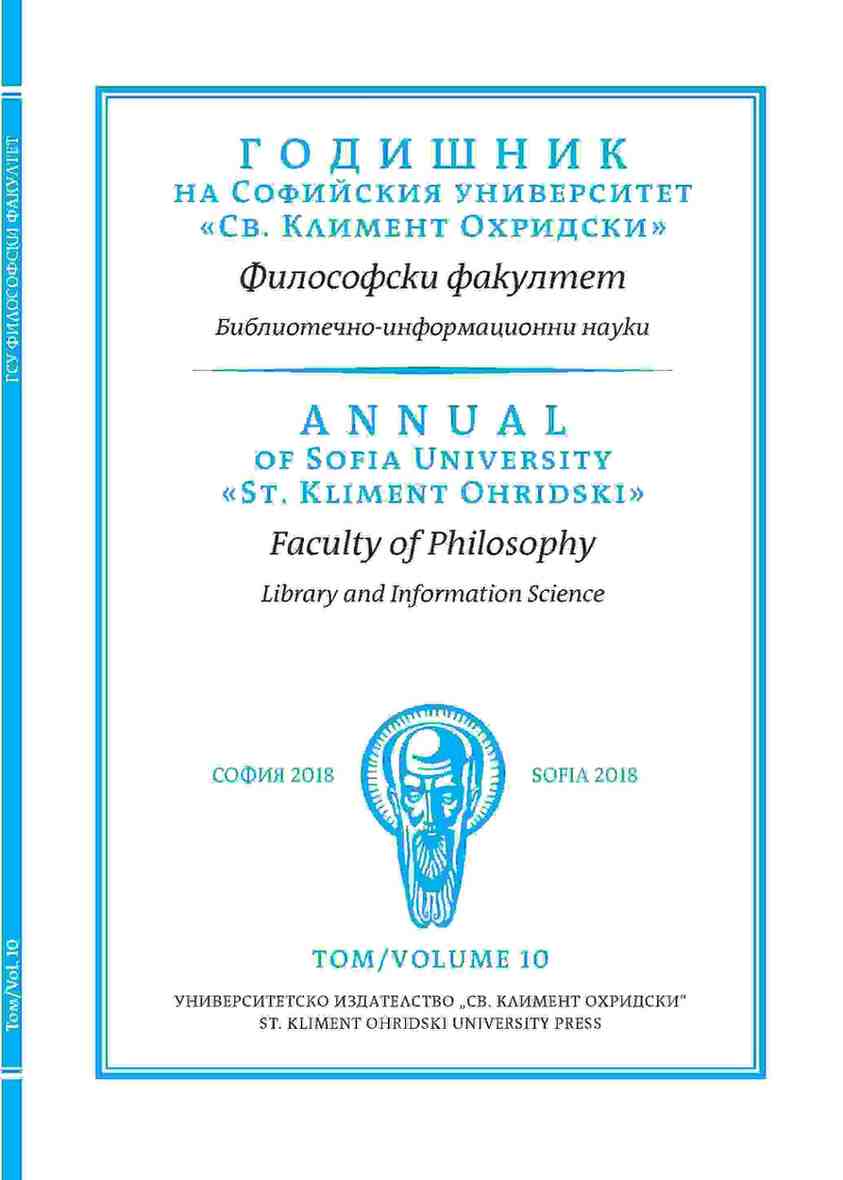
Within the Bulgarian national state, the civilizational social trends, the aspiration to assimilate European experience and mentality were largely demonstrated by the wave of women‘s periodicals published until the Second World War. Following the American historian Karen Offen‘s definition of historically existing feminisms, the women‘s press in the country could be divided into two large categories: newspapers and magazines with a clearly stated (individualist) feminist profile, discussing current socio-politically issues, directly corresponding to the status of the female gender, and periodicals labeled as „household press“ focusing on the „women‘s world“ understood as home and family, incorporating relational feminist arguments into their rhetoric. An example of the modernization efforts of the household periodicals in Bulgaria and their sensitivity to modern emancipatory ideas was one of the pioneering women‘s projects in that category – the magazine Moda i domakinstvo (Fashion and Household), 1897-1906. Edited and published by Elena Usheva, Moda i domakinstvo, like the household press in general, tried in parallel to respond to its own Bulgarian (and Balkan) social, economic and cultural context (marked by persistent patriarchal notions of roles, responsibilities and the social status of women) and emancipatory trends on a global scale.
More...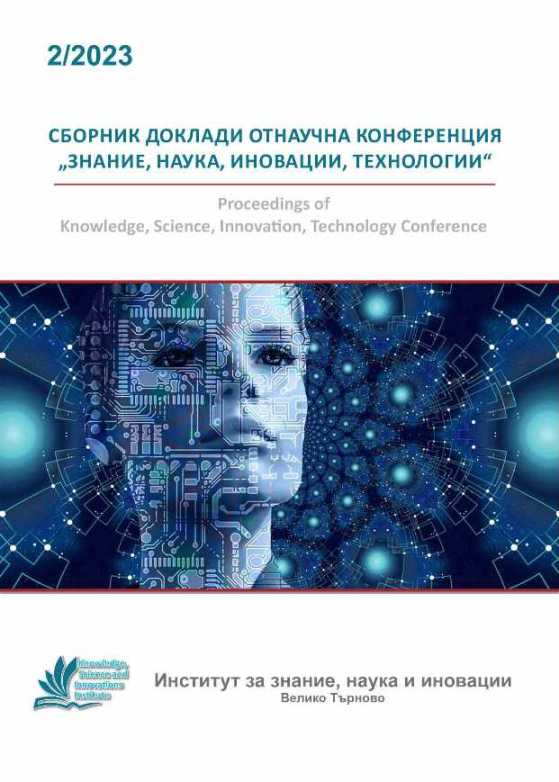
The supreme situation made by the Covid-19 pandemic made the administration show facility, develop considerably, offered electronic and remote services, overcome its own conservatism, and develop its possibilities in video communication. Digitalization turned into the most important achievement in this hard time, which has to be reserved and further developed. This will help to construct a fully, modern, intermunicipal co-operation and generation of logical regional initiatives.
More...
The application of facilities management in the museum sector is of utmost importance, as museums represent specific sites with complex infrastructure and unique needs. There are some aspects that apply to the implementation of facility management in museums. The identification of the specific needs and challenges related to the management of the historical museum in the city of Panagyurishte is essential for the successful implementation of facility management. They look at some of these needs and challenges that the topic covers.
More...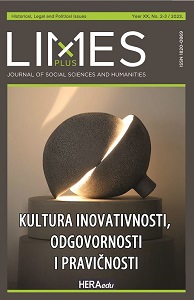
The first part of the paper explains the meaning of epigraphic monuments, the types of monuments and their importance for understanding of the past. The focus is on the value of this type of archaeological remains in the context of Southeast Europe. Th e paper also explains why classical epigraphic monuments should be digitalized because they are often inadequately stored in museums and other institutions. When it comes to the region of Southeast Europe, the majority of monuments were discovered in Croatia, but in other countries, this type of monument represents a valuable part of the classical heritage. To preserve these monuments and ensure that they are further used for research purposes, under the guidance of the Commissione epigrafi a e informatica (AIEGL), in 2003 it was decided to create an international network of epigraphic databases EAGLE (Electronic Archive of Greek and Latin Epigraphy). For twenty years, epigraphers have been directly or indirectly working on the digitalization of classical epigraphic monuments which is one of the largest and longest archaeological projects in the world. Th e largest number of monuments from Roman provinces have been digitalized in the databases Epigraphic Database Heidelberg, Epigraphik-Datenbank Clauss / Slaby, Ubi Erat Lupa, Roman Inscriptions of Britain, and Hispania Epigraphica Online. When it comes to Roman provinces from South-eastern Europe, we should single out Epigraphic Database Heidelberg (EDH) and Epigraphic Database Clauss / Slaby (EDCS). Epigraphic Database Heidelberg stores 6838 inscriptions from Croatia, 855 inscriptions discovered in Bosnia and Herzegovina, 1460 inscriptions from Serbia, 384 from the territory of Albania, 315 from Montenegro, 375 from Northern Macedonia and 1108 from Slovenia.
More...
In contemporary times, ancient towns and their fortifi cations have deviated from their original defensive purposes. Technological advancements rendered the once crucial walls and citadels obsolete, leading to their transformation into historical monuments and tourist destinations. Originally strategically positioned to safeguard inhabitants from potential threats, these fortifi cations, now perched in remote locations, have evolved to embrace an opposite role-to entice tourists by ensuring accessibility. Adhering to modern standards poses a challenge, particularly in maintaining authenticity while meeting present-day requirements. Th is study concentrates on the alleys within the Old Town of Ulcinj/Ulqin (Montenegro) and the pathways leading to the fortress. Th e approaches to the city gates, characterized by steep inclines, prove challenging for various individuals, particularly those with limited mobility. Adhering to current standards necessitates the implementation of a versatile elevator within the fortress, while the narrow, sloped, and irregularly paved stone alleys need adjustments to accommodate pedestrians with reduced mobility and meet daily functional needs. Post recent natural disasters, the alleys have further constricted due to ill-advised expansions of residences, rendering them inconvenient for both everyday activities and tourist visits. Considering historical changes and events, the objective is to analyze the current situation and devise an optimal solution that transforms the once impervious fortress into an easily accessible tourist attraction.
More...
Culture has an invisible, but great influence on economic growth, intercultural dialogue, creative industries and tourism of an area. The relationship between culture, cultural heritage and tourism, with numerous engagements and activities based on the concept of sustainable cultural heritage, with the economic benefits of tourism, from the aspect of responsible and sustainable business, have been the subject of special types of interest and research for a long time. Th e connection between culture and tourism can be a powerful economic lever, but only in such a way that benefits for the area and the local community are achieved through responsible management. Th e aim of this paper is to present the synergy of culture, tourism and innovations of the 4.0 revolution, in the function of forming modern cultural tourist content that are continuous ambassadors of a space. By applying mapping, analyzing case studies and office research, this paper confirms the advantage of applying 4.0 information solutions and activities in culture, in the function of overcoming external factors, for example the COVID 19 pandemic, which can disrupt tourist movements and thus reduce the effectiveness of cultural tourism as ambassador of a space.
More...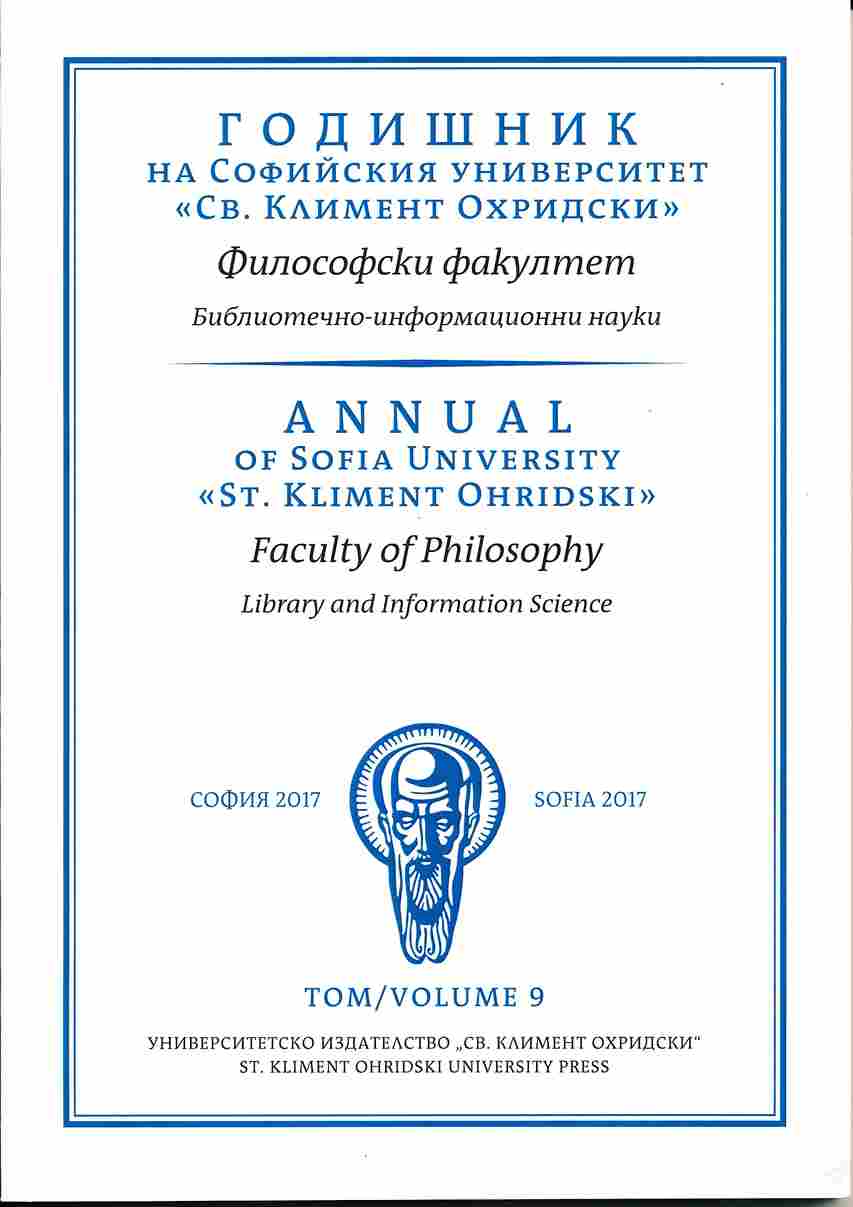
This article examines the main directions that determine the necessity of continuous development of one's information culture. It goes through the dynamic progress of information technologies, that is significantly changing our information environment; the rapid increase of the information itself; the necessity of continuing professional develpoment and lifelong education. The text is especially focusing on development of Bulgarian specialists' information culture through profetional education and qualification. In this context as an example are given and examined the courses of study of the Library Studies, Scientific Information and Cultural Policy of the Sofia University St. Kliment Ohridski, together with both the initiatives of the Bulgarian Library and Information Association and the projects of the regional libraries. There are also indicated some practical ways of increasing users' information litteracy, that require general modernization of the work of the libraries; creating and offering more and qualitative information resources online; improving on communication with virtual users through library's internet page and its presence in social media.
More...
This article is an attempt to present manifestations of digital culture in several fields: video games, the creation of electronic resources with the participation of students and the role of libraries. The aim is to find intersections between rhetoric and digital culture, visual and verbal elements.
More...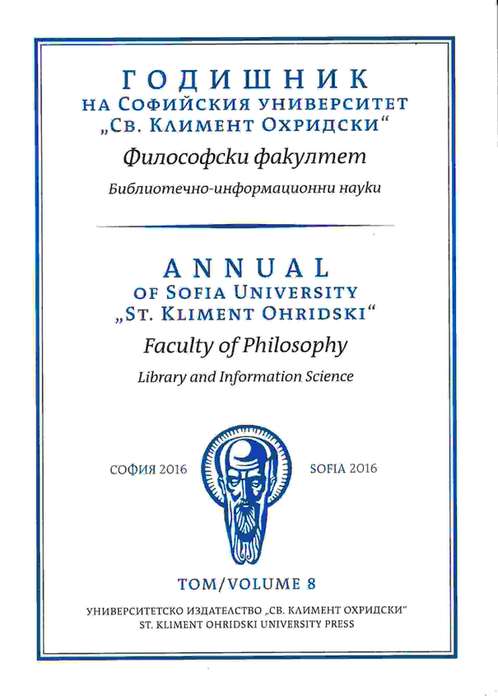
The article presents some issues that are still controversial and some of them still shrouded in speculation. The research is about Coin Systems (Cryptocurrency) that already have a strong influence on markets and assume the role of an actor in financial flows. Coin Systems influence production and marketing of hardware and e-business as a whole. On the financial markets now, join new currencies, new forms of exchange and new competitors. On the other hand, what is happening with Coin Systems can be seen as another step in the search for solutions on the constant pursuit of increased profits as a whole. What predictions can outline concerning the future of Coin Systems and financial flows in the modern world? The answer of the question in fact is delineation the direction of Information Society, the trends of the Internet of Things and the modern ecosystems (heavily influenced by IT). Obviously, the new exchange by the Cryptocurrency inevitably targets allocate of superabundance. But for the first time these currencies are created by software that follows a mathematical formula. Mathematical formula and software are freely available to anyone who wishes to use them. Then? Is there a revolution in the field of exchange funds? If "yes", whether and how it is related to the phenomenon Coyne-ecosystem? Can it assume that the level of knowledge and skills in the use of virtual tools will be the key factor which heavily influences the differentiation of people and their digital equality / inequality?
More...